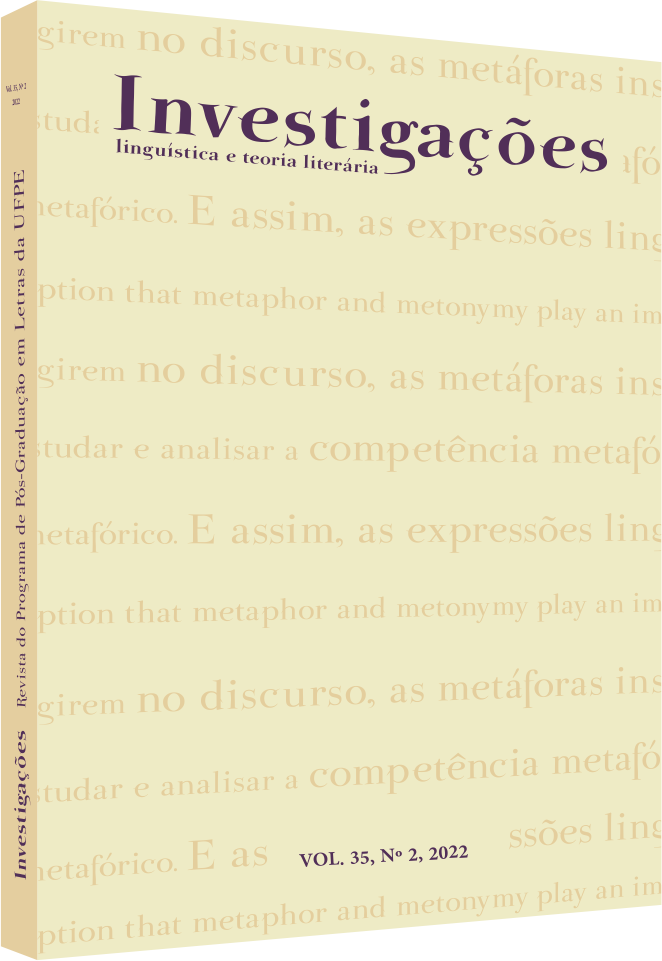O “rapto” de Marciano Indi e o incentivo ao “tribalismo” em Guiné-Bissau: contradições em discurso
DOI:
https://doi.org/10.51359/2175-294x.2022.254261Keywords:
political discourse, tribalist discourse, Guinea Bissau, contradiction.Abstract
The reference to “tribalism” has fleetingly gained notoriety, constituting a concern for society in general, especially by encouraging violence. Based on the discourse analysis inaugurated by Michel Pêcheux, we recover the alleged kidnapping of Marciano Indi, which took place on May 22, 2020, motivated by political persecution. Under the argument of claiming responsibility for the aforementioned “kidnapping”, in the immediacy of saying, an attempt is made to produce meanings that it is just a political struggle. However, the elements of traditional knowledge summoned reify a discourse with a “tribalist” bias, inciting hatred between the Pepel and Balanta ethnic groups.References
AMONA, Dingana Paulo Faia. Narrativas da nação guineense a partir da literatura. 2016. 55f. Trabalho de Conclusão de Curso (Graduação em Humanidades) - Universidade da Integração Internacional da Lusofonia Afro-Brasileira. Redenção-CE, 2016.
CARDOSO, Carlos. Guiné-Bissau: um país de tribalistas? In: AUGEL, Johannes; CARDOSO, Carlos. Transição democrática na Guiné-Bissau e outros ensaios. Instituto Nacional de Estudos e Pesquisa-INEP. Colecção Kacu Martel, vol. 10. 1996a.
CARDOSO, Carlos. Guineenses contra guineenses: por um debate sobre a(s) identidade(s) na Guiné-Bissau. In: AUGEL, Johannes; CARDOSO, Carlos. Transição democrática na Guiné-Bissau e outros ensaios. Instituto Nacional de Estudos e Pesquisa-INEP. Colecção Kacu Martel, vol. 10. 1996b.
COURTINE, Jean-Jacques. Metamorfoses do discurso político: derivas da vida pública. Organização: Carlos Piovezani Filho e Nilton Milanez. Revisão: Maria do Rosário Gregolin. São Carlos/SP: Claraluz, 2006.
COURTINE, Jean-Jacques. Análise do discurso político: o discurso comunista endereçado aos cristãos. Tradução de Cristina de Campos Velho Birck et al. São Carlos/SP: Claraluz, 2009.
GUIMARÃES, Eduardo. Espaço de Enunciação, Cena enunciativa, Designação. Fragmentum, Santa Maria, Jan-Mar, 2014, n. 40, p. 49-67.
GRUPO DO BANCO MUNDIAL. Perfil econômico da Guiné-Bissau. 2020. Disponível em: https://www.doingbusiness.org/content/dam/doingBusiness/country/g/guinea-bissau/GNB.pdf. Acesso em: 15 jul. 2020.
MANÉ, Fodé Abulai. A Mediação na resolução de conflitos: O caso de Bambadinca. Tese (Doutorado em Pós-colonialismos e Cidadania global). Universidade de Coimbra. Coimbra/Portugal, 2014. p. 263.
ORLANDI, Eni Pucinnelli. As formas do silêncio: no movimento dos sentidos. 6. ed. Campinas: Editora da Unicamp, 2007a.
ORLANDI, Eni Pucinnelli. Análise do Discurso: princípios e procedimentos. Campinas: Pontes, 2001/2007b.
PÊCHEUX, Michel. Semântica e discurso: uma crítica à afirmação do óbvio. Tradução de Eni Pulcinelli Orlandi et al. Campinas: Editora da Unicamp, 1997.
PÊCHEUX, Michel. Análise Automática do Discurso (AAD69). In: GADET, Françoise; HAK, Tony (org.). Por uma análise automática do discurso: uma introdução à obra de Michel Pêcheux. Tradução Bethania S. Mariani et al. Campinas/SP: Editora Unicamp, 1993.
Downloads
Published
How to Cite
Issue
Section
License
Copyright (c) 2022 Carmolino Cá, Sóstenes Ericson Vicente da Silva

This work is licensed under a Creative Commons Attribution 4.0 International License.
Authors who publish with Revista Investigações agree to the following terms:
Authors retain copyright and grant the journal right of first publication with the work simultaneously licensed under the Creative Commons Attribution 4.0 International (CC BY 4.0) license that allows others to share the work with an acknowledgement of the work's authorship and initial publication in this journal.
Authors are able to enter into separate, additional contractual arrangements for the non-exclusive distribution of the journal's published version of the work (e.g., post it to an institutional repository or publish it in a book), with an acknowledgement of its initial publication in this journal.
You are free to:
Share — copy and redistribute the material in any medium or format for any purpose, even commercially.
Adapt — remix, transform, and build upon the material for any purpose, even commercially.
The licensor cannot revoke these freedoms as long as you follow the license terms.
Under the following terms:
Attribution — You must give appropriate credit , provide a link to the license, and indicate if changes were made . You may do so in any reasonable manner, but not in any way that suggests the licensor endorses you or your use.
No additional restrictions — You may not apply legal terms or technological measures that legally restrict others from doing anything the license permits.

